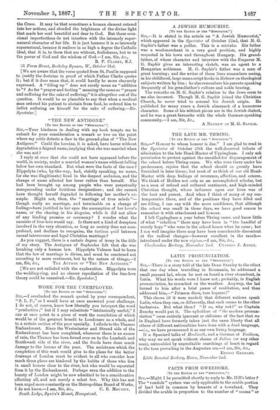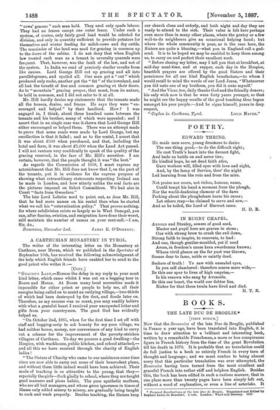FACTS FROM GWEEDORE.
[TO TEE EDITOR OF THE SPECTATOR:1
SIR,—Might I be permitted shortly to reply to Mr. Hill's letter P The " rundale" system was only applicable to the amble portion of land held in common by tenants of a townland. They divided the arable in proportion to the number of " somas " or
" cows' grasses " each man held. They used only spade labour. They had no fences except one outer fence. Under such a system, of course, only fairly good land would be selected for division, and only in quantity sufficient to provide potatoes for themselves and winter feeding for milch-cows and dry cattle. The remainder of the land was used for grazing in common up to the doors of the cabins. I do not deny that when English law treated each man as a tenant in severalty quarrels were frequent. That, however, was the fault of the law, and not of the system. In India we read of precisely similar results from like causes. Lord George Hill cut up grazing and all into parallelograms, and spoiled all. One man got a " cat " which produced only rocks, another got the "fat " of the townland, and all lost the benefit of free and common grazing at their doors. As to " mountain " grazing proper, that must, from its nature, be held in common, and I did not refer to it at all.
Mr. Hill hardly denies my statements that the tenants made all the houses, drains, and fences. He says they were " en- couraged and helped" by their landlord. How? I was engaged in, I think, about three hundred cases between the tenants and hie brother, many of which were appealed ; and I assert that in no single case was it shown that Lord George Hill either encouraged or helped them. There was an attempt made to prove that some roads were made by Lord George, but any recollection is that it failed ; and as to the rental, I assert that it was about £500 when purchased, and that, including the hotel and farm, it was about £1,600 when the Land Act passed. I will not venture very confidently to speak of the quality of the grazing reserved, in the face of Mr. Hill's assertion. I am certain, however, that the people thought it was " the best."
As regards the Commission of 1858, I must express my astonishment that Mr. Hill does not know that I, on the part of the tenants, put it in evidence for the express purpose of showing what extraordinary statements respecting Ireland can be made in London, and how utterly unlike the real facts are the pictures imposed on Select Committees. We had also in Court "facts from Gweedore."
The late Lord Leitrim used to point out, as does Mr. Hill, that he had more names on his rental than when he started what we call his " extermination policy." That proves nothing, for where subdivision exists so largely as in West Donegal, you can, after famine, eviction, and emigration have done their worst, still maintain the number of names on your rent-roll.—I am, Sir, &c.,



















































 Previous page
Previous page